-
Title
-
Negro Poets and Their Poems
-
This edition
-
"Negro Poets and Their Poems". Ed. Robert T. Kerlin. Washington, DC: Associated Publishers, 1923. xv+285 pp.
-
Other editions, reprints, and translations
-
• "Negro Poets and Their Poems". Ed. Robert T. Kerlin. 2nd ed. Washington, DC: Associated Publishers, 1935. xxi+342 pp.
Contains "an additional sixteen writers and thirty-six new selections" (Jeffrey Aaron Snyder. "Making Black History: The Color Line, Culture, and Race in the Age of Jim Crow." Athens: U of Georgia P, 2018. 190).
• "Negro Poets and Their Poems". Ed. Robert T. Kerlin. 3rd ed. Washington, DC: Associated Publishers, 1935. xxii+354 pp.
• "Negro Poets and Their Poems". Ed. Robert T. Kerlin. 4th ed. Washington, DC: Associated Publishers, 1947.
-
 Negro Poets and Their Poetry (4th ed.)
Negro Poets and Their Poetry (4th ed.)
-
Table of contents
-
This work offers critical discussion of "Negro Poets and Their Poems": it is not an anthology in the usual sense, but in the course of its discussion, it quotes 157 complete poems (as well as offering extracts from many others). In the contents below, I've incorporated all the authors and poems that are mentioned in the index to titles:
Chapter 1: The Present-Day Negro Heritage of Song:
I. Untaught Melodies: Folk Song – The Spirituals – The Seculars:
• Folk Song / Chicken in the Bread Tray (15)
• Folk Song / Juba (16)
• Folk Song / Fattening Frogs for Snakes (17)
• Folk Song / She Hugged Me and Kissed Me (17)
II. The Earlier Poetry of Art: Jupiter Hammon and Phillis Wheatley – Charles L. Reason – George Moses Horton – Mrs. Frances E. W. Harper – James Madison Bell and Albery A. Whitman – Paul Laurence Dunbar – J. Mord Allen.
• Mrs. Frances E. W. Harper / Truth (28)
• Mrs. Frances E. W. Harper / Vashti (30)
• J. D. Corrothers / Dunbar (37)
• Paul Laurence Dunbar / Ere Sleep Comes Down to Soothe the Weary Eyes (41)
• Paul Laurence Dunbar / Life (43)
• Paul Laurence Dunbar / Ode to Ethiopia (44)
• Paul Laurence Dunbar / With the Lark (46)
• Paul Laurence Dunbar / We Wear the Mask (47)
• J. Mord Allen / Counting Out (48)
• J. Mord Allen / The Psalm of the Uplift (50)
Chapter 2: The Present Renaissance of the Negro:
I. A Glance at the Field
• C. B. Johnson / Humor (52)
• W. T. Carmichael / It’s All Through Life (53)
• J. W. Johnson / To America (53)
• G. M. McClellan / In the Heart of a Rose (54)
• Mrs. Alice Dunbar-Nelson / Violets (55)
• Miss Mary Effie Lee / Sunset (56)
• Miss Winifred Virginia Jordan / Loneliness (56)
• L. B. Watkins / A Prayer of the Race That God Made Black (59)
• Mrs. Georgia Douglas Johnson / Peace (61)
• W. E. Hawkins / In Spite of Death (62)
• C. B. Johnson / My People (63)
• Fenton Johnson / I Played on David’s Harp (65)
• W. E. Bailey / The Slump (65)
• Joseph S. Cotter, Jr. / The Mulatto to His Critics (67)
• Miss Eva A. Jessye / The Singer (69)
II. Some Representatives of the Present Era: The Cotters, Father and Son – James David Corrothers – A Group of Singing Johnsons: James Weldon Johnson, Charles Bertram Johnson, Fenton Johnson, Adolphus Johnson – William Stanley Braithwaite – George Reginald Margetson – William Moore – Joshua Henry Jones, Jr. – Walter Everette Hawkins – Claude McKay – Leslie Pinckney Hill.
• Joseph S. Cotter, Sr. / The Boy and the Ideal (74)
• Joseph S. Cotter, Sr. / The Threshing Floor (75)
• Joseph S. Cotter, Sr. / The Flowers Take the Tears (76)
• Joseph S. Cotter, Sr. / Oh, My Way and Thy Way (81)
• Joseph S. Cotter, Jr. / Rain Music (81)
• Joseph S. Cotter, Jr. / Compensation (82)
• Joseph S. Cotter, Jr. / The Band of Gideon (83)
• J. D. Corrothers / The Dream and the Song (85)
• J. D. Corrothers / At the Closed Gate of Justice (88)
• J. D. Corrothers / The Negro Singer (89)
• J. W. Johnson / O Southland (92)
• J. W. Johnson / The Glory of the Day Was in Her Face (93) [given as "226" in index of Titles]
• J. W. Johnson / The Young Warrior (94)
• C. B. Johnson / Soul and Star (96)
• C. B. Johnson / Old Friends (97)
• C. B. Johnson / So Much (98)
• C. B. Johnson / A Rain Song (99)
• Fenton Johnson / These Are My People (100)
• Fenton Johnson / The Plaint of the Factory Child (101)
• Fenton Johnson / The Mulatto’s Song (101)
• Fenton Johnson / The New Day (102)
• W. S. Braithwaite / Sandy Star (106)
• W. S. Braithwaite / It’s a Long Way (106)
• W. S. Braithwaite / Foscati (108)
• W. S. Braithwaite / Autumn Sadness (108)
• W. S. Braithwaite / Thanking God (109)
• George Reginald Margetson / The Light of Victory (110)
• William Moore / Expectancy (112)
• William Moore / As the Old Year Passed (112)
• J. H. Jones, Jr. / Turn Out the Light (114)
• J. H. Jones, Jr. / A Southern Love Song (115)
• J. H. Jones, Jr. / The Heart of the World (117)
• J. H. Jones, Jr. / Brothers (118)
• W. E. Hawkins / Credo (119)
• W. E. Hawkins / Hero of the Road (122)
• W. E. Hawkins / The Death of Justice (123)
• W. E. Hawkins / Ask Me Why I Love You (125)
• Claude McKay / Spring in New Hampshire (127)
• Claude McKay / The Lynching (128)
• Claude McKay / The Harlem Dancer (128)
• Claude McKay / In Bondage (129)
• R. G. Dandridge / Zalka Peetruza (130)
• L. P. Hill / Mater Dolorosa (134)
• L. P. Hill / To a Caged Canary in a Negro Restaurant (136)
• L. P. Hill / To a Nobly-Gifted Singer (137)
• L. P. Hill / Self-Determination (137)
Chapter 3: The Heart of Negro Womanhood: Miss Eva A. Jessye – Mrs. J. W. Hammond – Mrs. Alice Dunbar-Nelson – Mrs. Georgia Douglas Johnson – Miss Angelina W. Grimke – Mrs. Anne Spencer – Miss Jessie Fauset.
• Miss Eva A. Jessye / Spring with the Teacher (139)
• Miss Eva A. Jessye / To a Rosebud (141)
• Mrs. J. W. Hammond / The Optimist (143)
• Mrs. J. W. Hammond / To My Neighbor Boy (143)
• Mrs. Alice Dunbar-Nelson / I Sit and Sew (145)
• Mrs. Alice Dunbar-Nelson / The Lights at Carney’s Point (146)
• Mrs. Georgia Douglas Johnson / The Dreams of the Dreamer (148)
• Mrs. Georgia Douglas Johnson / What Need Have I for Memory (149)
• Mrs. Georgia Douglas Johnson / Smothered Fires (150)
• Mrs. Georgia Douglas Johnson / The Octoroon (151)
• Miss Angelina W. Grimké / Dawn (153)
• Miss Angelina W. Grimké / A Winter Twilight (153)
• Miss Angelina W. Grimké / The Puppet-Player (153)
• Miss Angelina W. Grimké / The Want of You (154)
• Miss Angelina W. Grimké / El Beso (154)
• Miss Angelina W. Grimké / At the Spring Dawn (154)
• Miss Angelina W. Grimké / To Keep the Memory of Charlotte Forten Grimké (155)
• Mrs. Anne Spencer / At the Carnival (158)
• Miss Jessie Fauset / Oriflamme (162)
Chapter 4: Ad Astra per Aspera: I. Per Aspera: Edward Smythe Jones – Raymond Garfield Dandridge – George Marion McClellan – Charles P. Wilson – Leon R. Harris – Irvin W. Underhill; II. Ad Astra: James C. Hughes – Leland Milton Fisher – W. Clarence Jordan – Roscoe C. Jamison.
• E. W. [sic] Jones / Flag of the Free (167)
• R. G. Dandridge / The Poet (170)
• R. G. Dandridge / To --- (171)
• R. G. Dandridge / Time to Die (171)
• R. G. Dandridge / Eternity (172)
• R. G. Dandridge / Facts (172)
• G. M. McClellan / To Hollyhocks (176)
• G. M. McClellan / The Hills of Sewanee (176)
• G. M. McClellan / The Feet of Judas (177)
• G. M. McClellan / In Memory of Katie Reynolds, Dying (178)
• Charles P. Wilson / Somebody’s Child (179)
• Leon R. Harris / The Steel Makers (182)
• Irvin W. Underhill / To Our Boys (185)
• James C. Hughes / Apology for Wayward Jim [excerpt] (188)
• L. M. Fisher / For You, Sweetheart (189)
• W. Clarence Jordan / What Is the Negro Doing? (190)
• Roscoe C. Jamison / Castles in the Air (193)
• Roscoe C. Jamison / A Song (193)
• Roscoe C. Jamison / The Edict (194)
• Roscoe C. Jamison / Hopelessness (195)
Chapter 5: The New Forms of Poetry. I. Free Verse: Will Sexton – Andrea Razafkeriefo – Langston Hughes; II. Prose Poems: W. E. Burghardt DuBois – Kelly Miller – Charles H. Conner – William Edgar Bailey – R. Nathaniel Dett.
• Will Sexton / The Bomb Thrower (197)
• Will Sexton / The New Negro (197)
• Andrea Razafkeriefo / The Negro Church (198)
• Langston Hughes / The Negro (200)
• W. E. B. DuBois / A Litany of Atlanta (202)
• Kelly Miller / I See and Am Satisfied (207)
• Charles H. Conner / The Life of the Spirit in the Natural World (210)
• W. E. Bailey / To a Wild Rose (213)
• R. Nathaniel Dett / At Niagara (216)
Chapter 6: Dialect Verse: Waverley Turner Carmichael – Joseph S. Cotter, Sr. – Raymond Garfield Dandridge – Sterling M. Means – J. Mord Allen – James Weldon Johnson – Theodore Henry Shackleford.
• W. T. Carmichael / Mammy’s Baby Scared (219)
• Joseph S. Cotter, Sr. / The Don’t-Care Negro (220)
• R. G. Dandridge / De Innah Part (221)
• S. M. Means / The Old Plantation Grave (222)
• S. M. Means / De Ole Deserted Cabin (223)
• J. Mord Allen / A Victim of Microbes (224)
• J. W. Johnson / My Lady’s Lips Am Like De Honey (226)
Chapter 7: The Poetry of Protest: Lucian B. Watkins.
• Winston Allen / The Black Violinist (230)
• Anonymous / Old Jim Crow (231)
• Mrs. Georgia Douglas Johnson / To My Son (232)
• Will Sexton / To My Lost Child (233)
• J. W. Johnson / The Black Mammy (236)
• L. B. Watkins / I’ve Loved and Lost (237)
• L. B. Watkins / The New Negro (236) [sic, 238]
• L. B. Watkins / A Message to the Modern Pharaohs (239)
• Mrs. Carrie W. Clifford / An Easter Message (240)
• Claude McKay / If We Must Die (241)
Chapter 8: Miscellaneous: I. Eulogistic Poems; II. Commemorative and Occasional Poems.
• Claude McKay / The Negro (244)
• John J. Fenner, Jr. / Rise! Young Negro--Rise! (245)
• G. M. McClellan / Daybreak (246)
• Andrea Razafkeriefo / The Negro Woman (247)
• Joseph S. Cotter, Sr. / The Negro Child (248)
• Mrs. Georgia Douglas Johnson / The Mother (249)
• Ben E. Burrell / To a Negro Mother (249)
• Mrs. Mae Smith Johnson / To My Grandmother (251)
• L. B. Watkins / Ebon Maid and Girl of Mine (252)
• J. E. French / Dunbar and Cotter (253)
• Miss Corinne E. Lewis / Christmas Cheer (255)
• J. H. Jones, Jr. / Goodbye, Old Year (256)
• Miss H. Cordelia Ray / The Months (257)
• D. T. Williamson / While April Breezes Blow (260)
• Edwin G. Riley / A Nation’s Greatness (262)
• W. S. Braithwaite / Thanksgiving (262)
• Andrea Razafkeriefo / Rainy Days (263)
Index of Authors, with Biographical and Bibliographical Notes.
Index of Titles.
-
About the anthology
-
• The 1923 edition contains 157 complete poems: 5 by unnamed authors (folk songs or anonymous); the rest by 57 named authors. There are also many extracts from other poets.
• In the 1935 edition, "The index to the seventy-four black American poets (pp. 269-279) contains early minor as well as major poets, with bio-bibliographical notes. Also contains an index to titles (pp. 281-285)" (Rowell 1972: 57).
• The editor of the anthology, Robert Thomas Kerlin (1866-1950), was a white Quaker from Kentucky, whose parents were slaveholders (Water's Edge Museum, Oxford, Maryland). He attended graduate school at Yale and "had been a Methodist minister before the turn of the century, and he taught English across the South until he settled at Virginia Military Institute in 1910. In 1921 [just a few years before the publication of this anthology], Kerlin wrote a stirring protest to the Governor of Arkansas about the treatment of blacks in the aftermath of the Phillips County Riot; 'The Nation' published the letter ["An Open Letter to the Governor of Arkansas," "The Nation" 112 (15 June 1921): 847-48] and Virginia Military Institute fired him. ["A Poor Way with Dissenters" is an editorial response to the firing in "Outlook" 129 (7 Sept. 1921): 10-11.] He continued to teach at small colleges and became active in labor affairs. In 1948, only two years before his death at the age of eighty-four, he was the Socialist Party nominee for Presidential elector from Maryland" (Potter 1986: 277). Kerlin had already published a pamphlet on "Contemporary Poetry of the Negro" (1921) and the present anthology went through four editions through 1947 (Kinnamon 1997: 469). The collection "contains several poems not anthologized elsewhere as well as numerous scarce photographs of poets" (Kinnamon 1997: 469).
-
(Water's Edge Museum)
-
Reviews and notices of anthology
-
• Rev. of "Negro Poets and Their Poems." "Journal of Negro History" 9.1 (1924): 90-91. JSTOR.
"This work would not interest the student of Negro history but for its vast amount of information as to the development of a Negro literature in the United States. This very thing itself, however, is history without a doubt; for it certainly presents what the race has thought and felt and attempted and accomplished. One finds in this work . . . beautifully embellished thought as to the strivings of the Negro and the manner in which the mind of the race is finding its own expression" (90). "The book as a whole causes it suddenly to dawn upon the reader that there is developing in the United States a new literature in the world of letters" (91).
The anonymous reviewer quotes another (unnamed) commentator on the anthology, who observes that the authors represented here "are not made sour or dumb by sorrow. They have glorified the cross. They have burned off the dross of bitter experience and grasped eagerly the residue of gold. Here one finds faith, defiance, gentleness, love of country, vision, warning, and the sense of beauty, all clothed in a remarkably moving rhythm of language" (91). This other commentator continues: "this book is both interpretation to the white neighbor of his dark brother's heart and mind, and the strongest possible indictment of those deliberate barriers raised by sheer race prejudice across the path of the black man's progress"; whatever limitations this collection may have, it reveals to "his white neighbor" that "the Negro . . . refuses to despair or admit defeat. He will let no present hindrance cloud his view. He will overcome the world not by might nor power, nor by any of the instruments of hatred, but by the spirit. He will overcome evil with good. He will take the way of beauty" (91).
"A large number of all but unknown writers and others new upon the stage pass here in review. In describing the struggles of these thinkers and depicting the conditions and forces which influenced their lives, the author unconsciously has written a long chapter in the history of the Negro. This is history, too, even if it does not deal with the leadership of armies and the administration of governments but with the development of the power to appreciate the good and the beautiful, for this is one of the tests by which any people must be judged in determining whether or not they have contributed much to the progress of mankind" (91).
-
JSTOR
-
• Rev. of "Negro Poets and Their Poems." "The Nation" 118 (16 April 1924): [455]. (a brief single-paragraph notice)
-
• Walrond, Eric. "Negro Poets." "The New Republic" 39 (4 June 1924): [53].
-
• White, Newman Ivey. Rev. of "Negro Poets and Their Poems." "South Atlantic Quarterly" 22 (July 1923): [282].
-
Commentary on anthology
-
• Use of this anthology in Negro colleges and universities is mentioned in Thomas L. Dabney's "The Study of the Negro" ("Journal of Negro History" 19.3 [1934], 285).
• "Kerlin was one of the first white anthologists to give his attention to the Negro author and many of his comments suggest the uncertainty, the fumbling for critical standards, the eagerness to extol the virtues and minimize the faults of the authors which one would expect to find in a commentary which essays a comparatively new field. The picture of Kerlin himself which emerges from the pages of his commentary suggests a man who achieves a kind of vicarious soul-purge of the wrongs which his race has inflicted upon members of the minority group. However, Kerlin does recognize and emphasize that the literature of the Negro author is essentially in the genre of American literature. He points out in his preface that the chief reward // of his reader could well be that the poetry of the 'children of Ham' is noteworthy for its likeness to the literature of other American groups rather than for the scattered points of racial distinctiveness. Kerlin ranks with [Benjamin] Brawley, [Alain] Locke, [V. F.] Calverton and Sterling Brown in the number of treatises which he has done on the literature of the Negro" (John S. Lash. "The Anthologist and the Negro Author." "Phylon" 8.1 [1947]: 68-76, at 71-72)
• Kerlin emphasizes the "Americanness" of poetry by American Negroes: "the reader's chief reward [for reading the poetry of Negro writers] . . . may be his discovery that, after all, a wonderfull likeness to the poetry of other races looks forth from this poetry . . . '" (John S. Lash. "What Is 'Negro Literature.'" "College English" 9.1 [1947]: 37-42, at 41).
• "Robert Kerlin, a Southerner who became interested in generic changes in Negro attitudes and employed literature as a documentation of these changes, attached great importance to the racial protestations of Negro authors, and postulated a 'conquest' of majority racial attitudes on the basis of poetry" (31); "Kerlin published a series of appreciation studies of Negro writers between 1919 and 1930, many of which were carried in the pages of the Negro journals, particularly "The Southern Workman". As a Southerner whose views on the Negro were considered 'dangerous,' Kerlin was subjected to considerable criticism, particularly in his section of the country. There was an interval during which his position as instructor in a Virginia college was threatened. However, Kerlin was not deterred in his writings, and was among the first critics to call attention to the works of Langston Hughes and Countee Cullen" (John S. Lash. "The Race Consciousness of the American Negro Author: Toward a Reexamination of an Orthodox Critical Concept." "Social Forces" 28.1 [1949]: 24-34, at 31n.46)
-
• Kerlin's anthology is discussed in the "Bibliographical and Critical Notes" to Newman Ivey White and Walter Clinton Jackson's "An Anthology of Verse by American Negroes" (1924): White and Jackson write that in Kerlin's anthology, "The poems are quoted in a critical and explanatory context by Dr. Kerlin. About 170 poems are quoted (many of them only in part, however) from over 70 writers. Poems of over two pages are excluded. The emphasis is primarily upon contemporary writers, the Poets from [Jupiter] Hammon to [Paul Laurence] Dunbar being briefly treated. Several minor poets have been omitted, and--a more serious fault--there is no mention of D. W. Davis, Benjamin Brawley, or John Wesley Holloway. Nevertheless, it is the most comprehensive collection of Negro verse, especially later verse, in the field. The author's accompanying prose contains considerable valuable information about the poets and their work, but is often unreliable in its critical judgments because it is not sufficiently dispassionate. The illustrations, including three sculptures by Meta Warwick Fuller and thirty-five portraits, add considerably to the value of the book" (226-27).
-
See also
-
• Kerlin, Robert Thomas. "The Voice of the Negro 1919". New York: E. P. Dutton, 1920. xii+188 pp.
"A compilation from the colored press of America for the four months immediately succeeding the Washington riot. It is designed to show the Negro's reaction to that and like events following, and to the World War and the Discussion of the Treaty" (from Preface; WorldCat).
-
 Voice of the Negro 1919
Voice of the Negro 1919
-
• Kerlin, Robert T. "A Poet from Bardstown." "South Atlantic Quarterly" 20.2 (July 1921): [213]. (A study of Joseph Seaman Cotter, Sr.)
-
• Kerlin, Robert T. "Some Singing Johnsons." "Outlook" 128 (3 Aug. 1921): [549]. (A study of the [unrelated] poets Charles Bertram Johnson, Fenton Johnson, and Georgia Douglass Johnson. The essay was incorporated into the second chapter of "Negro Poets and Their Poems" [Potter 1986: 277].)
-
• Kerlin, Robert T. "Contemporary Poetry of the Negro." "The Hampton Bulletin" (Hampton Normal and Agricultural Institute) 17.1 (1921): 23 pp. Also printed separately as "Contemporary Poetry of the Negro". 1921 [see links to Google Books and Internet Archive]; repr. Freeport, NY: Books for Libraries, 1971. 23 pp.
-
Internet Archive
-
Google Books
-
Internet Archive
-
• Kerlin, Robert T. "The Negro's New Cultural Conquest." "Friends Intelligencer" Second Month 15, 1930: 124-25. [Google Books]
-
Google Books
-
• Potter, Vilma R. "Race and Poetry: Two Anthologies of the Twenties." "CLA Journal" 29.3 (1986): 276-87.
-
Cited in
-
• Lash 1946: 724.
• Kinnamon 1997: 469.
-
Item Number
-
A0013a
 Negro Poets and Their Poetry (4th ed.)
Negro Poets and Their Poetry (4th ed.)
 Voice of the Negro 1919
Voice of the Negro 1919
 Front cover (2nd ed.)
Front cover (2nd ed.)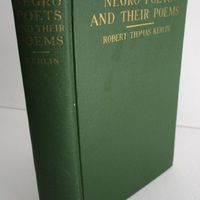 Front cover and spine sans dust jacket (1st ed.)
Front cover and spine sans dust jacket (1st ed.)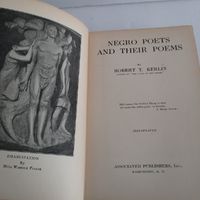 Title page and frontispiece (1st ed.)
Title page and frontispiece (1st ed.)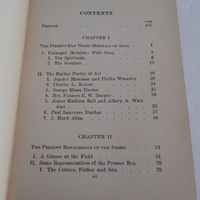 Table of contents 1 (1st ed.)
Table of contents 1 (1st ed.)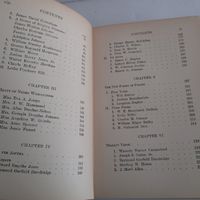 Table of contents 2 (1st ed.)
Table of contents 2 (1st ed.)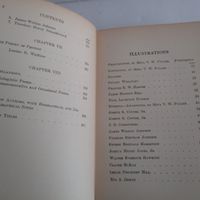 Table of contents 3 (1st ed.)
Table of contents 3 (1st ed.)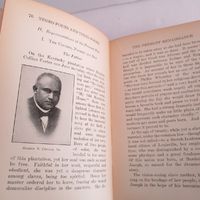 Sample page image (pp. 70-71) (1st ed.)
Sample page image (pp. 70-71) (1st ed.)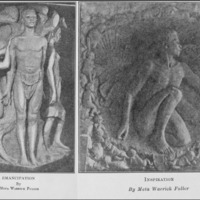 Illustrations-Emancipation (frontispiece) and Inspiration (p. 11), both by Meta Warrick Fuller
Illustrations-Emancipation (frontispiece) and Inspiration (p. 11), both by Meta Warrick Fuller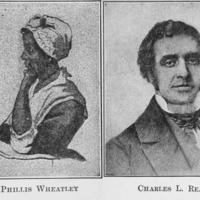 Illustrations-Phillis Wheatley (p. 23) and Charles L. Reason (p. 24)
Illustrations-Phillis Wheatley (p. 23) and Charles L. Reason (p. 24)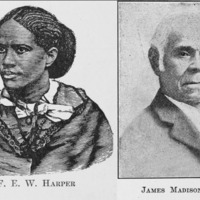 Illustrations-Frances E. W. Harper (p. 27) and James Madison Bell (p. 33)
Illustrations-Frances E. W. Harper (p. 27) and James Madison Bell (p. 33)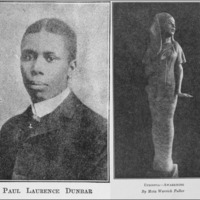 Illustrations-Paul Laurence Dunbar (p. 38) and Ethiopia-Awakening by Meta Warrick Fuller (p. 45)
Illustrations-Paul Laurence Dunbar (p. 38) and Ethiopia-Awakening by Meta Warrick Fuller (p. 45)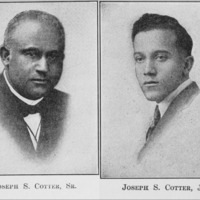 Illustrations-Joseph S. Cotter, Sr. (p. 70) and Joseph S. Cotter, Jr. (p. 81)
Illustrations-Joseph S. Cotter, Sr. (p. 70) and Joseph S. Cotter, Jr. (p. 81)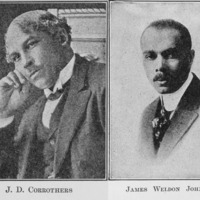 Illustrations-J. D. Corrothers (p. 86) and James Weldon Jonson (p. 95)
Illustrations-J. D. Corrothers (p. 86) and James Weldon Jonson (p. 95)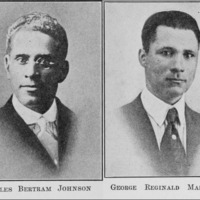 Illustrations-Charles Bertram Johnson (p. 95) and George Reginald Margetson (p. 110)
Illustrations-Charles Bertram Johnson (p. 95) and George Reginald Margetson (p. 110)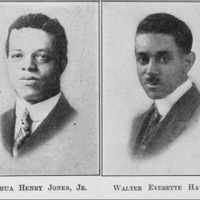 Illustrations-Joshua Henry Jones, Jr. (p. 113) and Walter Everette Hawkins (p. 121)
Illustrations-Joshua Henry Jones, Jr. (p. 113) and Walter Everette Hawkins (p. 121)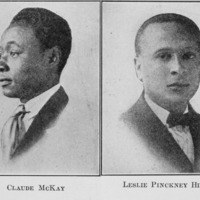 Illustrations-Claude McKay (p. 126) and Leslie Pinckney Hill (p. 131)
Illustrations-Claude McKay (p. 126) and Leslie Pinckney Hill (p. 131)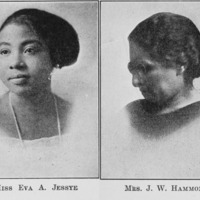 Illustrations-Miss Eva A. Jessye (p. 139) and Mrs. J. W. Hammond (p. 142)
Illustrations-Miss Eva A. Jessye (p. 139) and Mrs. J. W. Hammond (p. 142)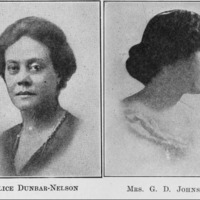 Illustrations-Alice Dunbar-Nelson (p. 145) and Mrs. G. D. Johnson (p. 148)
Illustrations-Alice Dunbar-Nelson (p. 145) and Mrs. G. D. Johnson (p. 148)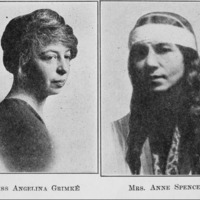 Illustrations-Miss Angelina Grimké (p. 152) and Mrs. Anne Spencer (p. 157)
Illustrations-Miss Angelina Grimké (p. 152) and Mrs. Anne Spencer (p. 157)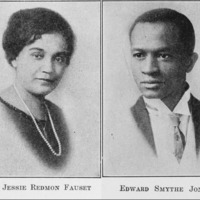 Illustrations-Miss Jessie Redmon Fauset (p. 160) and Edward Smythe Jones (p. 163)
Illustrations-Miss Jessie Redmon Fauset (p. 160) and Edward Smythe Jones (p. 163)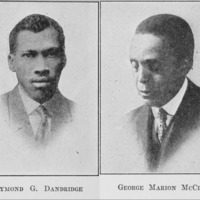 Illustrations-Raymond G. Dandridge (p. 169) and George Marion McClellan (p. 173)
Illustrations-Raymond G. Dandridge (p. 169) and George Marion McClellan (p. 173)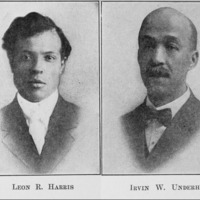 Illustrations-Leon R. Harris (p. 181) and Irvin W. Underhill (p. 185)
Illustrations-Leon R. Harris (p. 181) and Irvin W. Underhill (p. 185)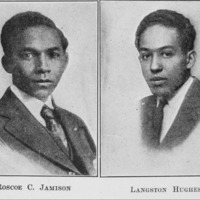 Illustrations-Roscoe C. Jamison (p. 192) and Langston Hughes (p. 199)
Illustrations-Roscoe C. Jamison (p. 192) and Langston Hughes (p. 199)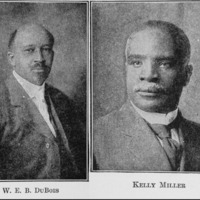 Illustrations-W. E. B. Du Bois (p. 201) and Kelly Miller (p. 206)
Illustrations-W. E. B. Du Bois (p. 201) and Kelly Miller (p. 206)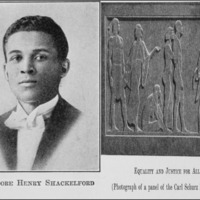 Illustrations-Theodore Henry Shackleford (p. 228) and Equality and Justice for All (panel of the Carl Schurz Monument) (p. 229)
Illustrations-Theodore Henry Shackleford (p. 228) and Equality and Justice for All (panel of the Carl Schurz Monument) (p. 229)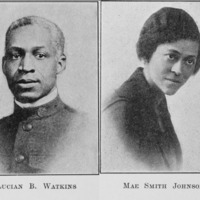 Illustrations-Lucian B. Watkins (p. 237) and Mae Smith Johnson (p. 243)
Illustrations-Lucian B. Watkins (p. 237) and Mae Smith Johnson (p. 243)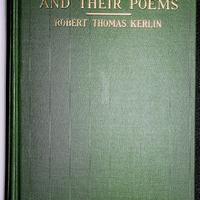 Front cover sans dust jacket (2nd ed.)
Front cover sans dust jacket (2nd ed.)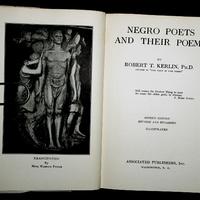 Title page and frontispiece (2nd ed.)
Title page and frontispiece (2nd ed.)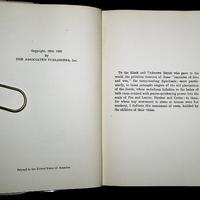 Copyright page and dedication (2nd ed.)
Copyright page and dedication (2nd ed.)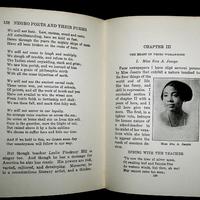 Sample page image (pp. 138-139) (2nd ed.)
Sample page image (pp. 138-139) (2nd ed.)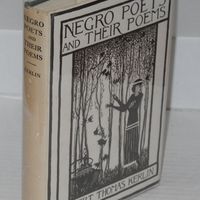 Front cover and spine (3rd ed.)
Front cover and spine (3rd ed.)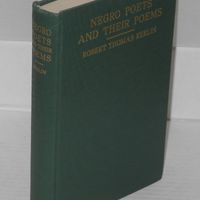 Front cover and spine sans dust jacket (3rd ed.)
Front cover and spine sans dust jacket (3rd ed.)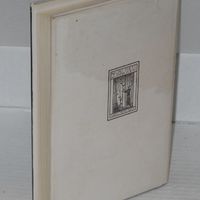 Back cover (3rd ed.)
Back cover (3rd ed.)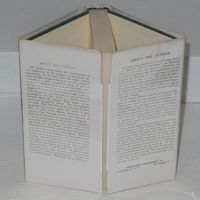 Dust jacket flaps (3rd ed.)
Dust jacket flaps (3rd ed.)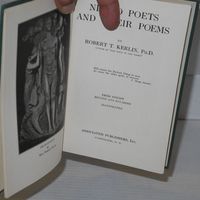 Title page and frontispiece (3rd ed.)
Title page and frontispiece (3rd ed.)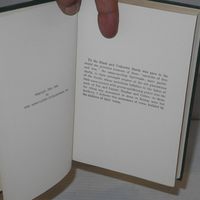 Copyright page and dedication (3rd ed.)
Copyright page and dedication (3rd ed.)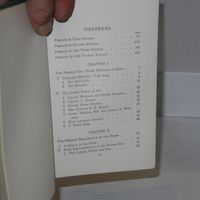 Table of contents 1 (3rd ed.)
Table of contents 1 (3rd ed.) Voice of the Negro 1919
Voice of the Negro 1919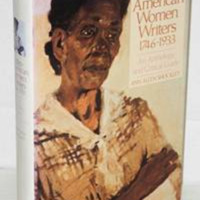 Afro-American Women Writers, 1746-1933: An Anthology and Critical Guide
Afro-American Women Writers, 1746-1933: An Anthology and Critical Guide Negro Poets and Their Poetry (4th ed.)
Negro Poets and Their Poetry (4th ed.)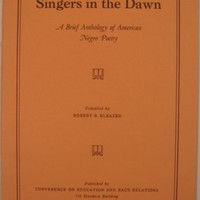 Singers in the Dawn: A Brief Supplement to the Study of American Literature; repr. as Singers in the Dawn: A Brief Anthology of Negro Poetry
Singers in the Dawn: A Brief Supplement to the Study of American Literature; repr. as Singers in the Dawn: A Brief Anthology of Negro Poetry



































